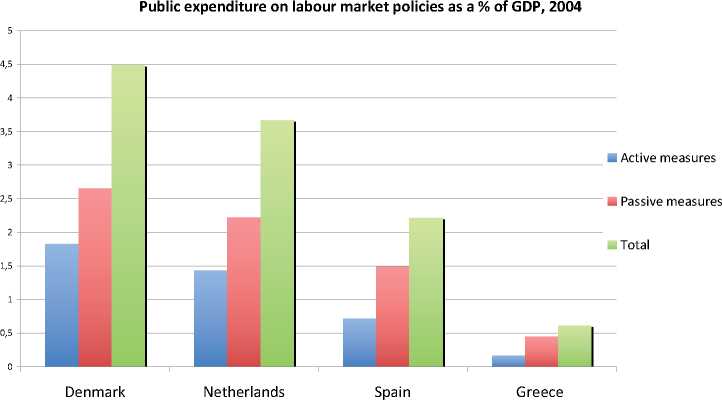Flexibility and security: an asymmetrical relationship?
the precarious workers to denounce their employers, encourage a significant number of compa-
nies and organisations, even large ones, to systematically use the violation of legislation as a way of
cutting labour costs and staying in business.
Active labour market policies
As we have seen in section 3.2. (Table 3), Greece has the least developed active labour market
policies in the EU-15, with Spain doing better than all the other Southern European countries, whilst
Denmark is the EU champion in both active and passive labour market spending and the Netherlands
rank at the 2nd position regarding active measures and total expenditure. Overall, total public expendi-
ture on labour market policies in Denmark is twice as big as in Spain and more than 7 times as big as
in Greece, pointing to one of the most consequential underlying factors for the huge differences in
the enforcement of the flexicurity agenda amongst these countries.
Table 6

* figures for Greece do not include Public Employment Services and administration costs
Source: OECD Employment Outlook 2006, Statistical Annex
Page • 73
More intriguing information
1. 5th and 8th grade pupils’ and teachers’ perceptions of the relationships between teaching methods, classroom ethos, and positive affective attitudes towards learning mathematics in Japan2. Graphical Data Representation in Bankruptcy Analysis
3. Aktive Klienten - Aktive Politik? (Wie) Läßt sich dauerhafte Unabhängigkeit von Sozialhilfe erreichen? Ein Literaturbericht
4. The name is absent
5. The name is absent
6. The Evolution
7. Economic Evaluation of Positron Emission Tomography (PET) in Non Small Cell Lung Cancer (NSCLC), CHERE Working Paper 2007/6
8. Ahorro y crecimiento: alguna evidencia para la economía argentina, 1970-2004
9. The name is absent
10. The name is absent